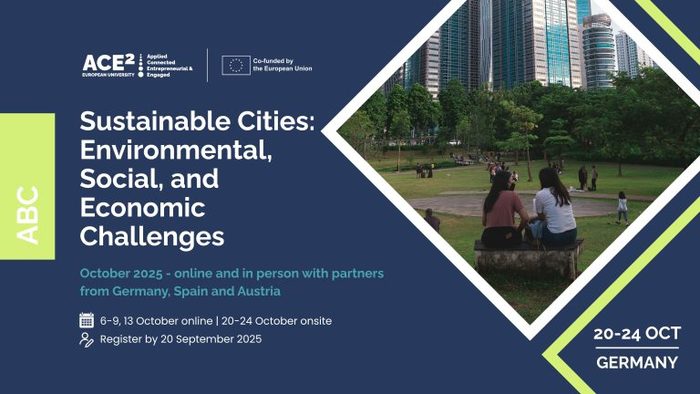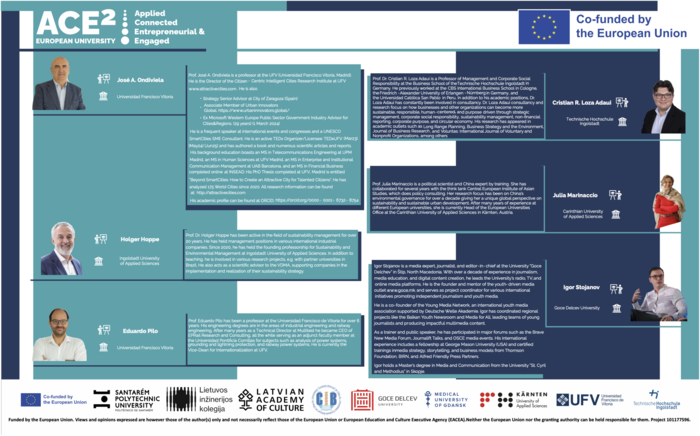Sustainable Cities: Environmental, Social, and Economic Challenges
20.08.2025
Sustainable Cities: Environmental, Social, and Economic Challenges
Date/Period: October 2025
Daily Schedule: will be provided to the selected students during the last week of September
Organized by: Technische Hochschule Ingolstadt (Germany)
Registration and Participation: Register via Google Form
Deadline for registration: 20 September 2025, 00:00 CET
Participants must attend the full session and contribute to collaborative tasks.
Objectives of the Call
The primary objective of the program is to enhance the understanding and strategic relevance of urban sustainability. It aims to equip students with interdisciplinary tools to:
- Explore sustainable urban development with a focus on environmental, social, and economic aspects.
- Address real-life municipal challenges, specifically in sustainable urban transformation in Ingolstadt, Germany.
Specific objectives include:
- Critically assess city sustainability performance.
- Analyze and apply sustainability indicators.
- Co-create plans to attract and retain talent.
- Foster cross-sectoral collaboration (technology, governance, community).
Course Short Description
Format: Applied Blended Challenge (ABC) Program
Organisers:
- Host: Technische Hochschule Ingolstadt (THI)
- Co-hosts: Universidad Francisco de Vitoria (UFV), Carinthia University of Applied Sciences (CUAS)
- Location: Ingolstadt, Germany
- Stakeholder: City of Ingolstadt
Short Description: The course is a blended, challenge-based program that immerses students in real-world urban challenges. It combines weekly online learning with an intensive face-to-face project week in Ingolstadt, where students co-develop strategic policy solutions for local governments. The course integrates sustainability science, smart city approaches, stakeholder analysis, and policy communication tools to foster actionable solutions and entrepreneurial thinking in international student teams.
ECTS: 3 credits
Duration
- Online: 6-9 October 2025, 15:00-17:00 CEST and 13 October 2025, 10:00-12:00 CEST
- On-site: 20-24 October 2025
Target Group
Students from ACE²-EU partner universities (Quota: 4 students per university)
Profile:
- Students from diverse academic backgrounds (urban planning, environmental studies, business, public policy, engineering, etc.)
- Motivated to work on real-world municipal challenges
- Interested in sustainability, smart cities, and international collaboration
Expected skills/attitudes:
- Willingness to collaborate in interdisciplinary and intercultural teams
- Proactive engagement in both online and face-to-face sessions
- Openness to entrepreneurial and policy-oriented thinking
Learning Objectives
- Understand the sustainability challenges faced by urban areas, with emphasis on mid-sized European cities.
- Analyze the sustainability performance of cities using global frameworks and indicators (e.g., SDG Index, ISO 37120).
- Apply tools to develop solutions for real-life urban issues.
- Engage with public and private stakeholders, understanding governance structures and strategic materiality in city planning.
- Co-create actionable strategic concepts, including executive policy briefs for municipal actors.
- Translate analytical insights into policy-relevant recommendations and public impact narratives.
- Collaborate in international, interdisciplinary teams, enhancing team-building, communication, and project management skills.
- Communicate proposals effectively, both visually and verbally, during a final pitch to city stakeholders.
Certification
A certificate of attendance will be issued by the course organizers upon successful participation. The certificate will list:
- Course title
- Learning outcomes
- Developed competences
- Duration (10 hrs. synchronous online / 24 hrs. synchronous onsite + 56 hrs. independent and group work)
Contact & Coordination
Technische Hochschule Ingolstadt
Prof. Katherine Roegner – katherine.roegner@thi.de

